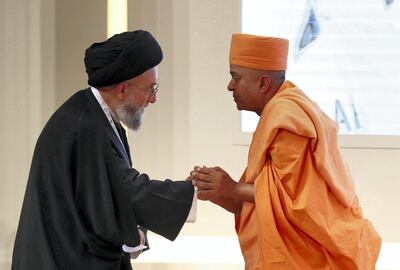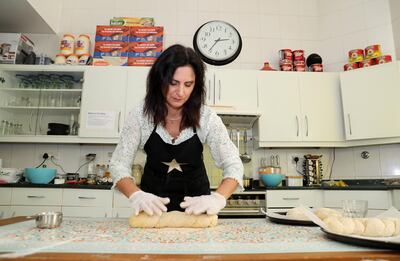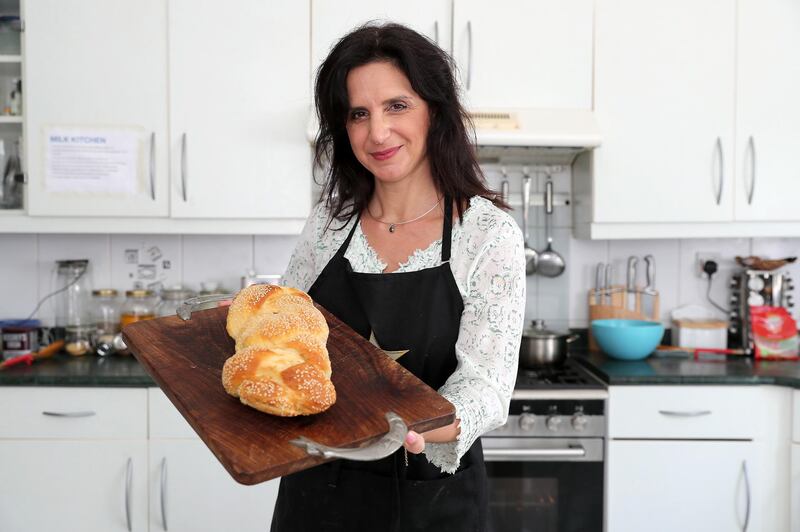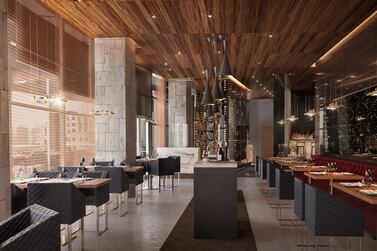Chebab pancakes served like blintzes. Balaleet noodles baked like kugel. Cholent stew simmered with a bzar spice blend.
Elli Kriel calls it Kosherati, kosher cooking with an Emirati twist.
Kriel is the creator of Elli’s Kosher Kitchen, which provides hearty home-cooked meals that are kosher, meeting the dietary requirements of Jewish law.
She launched her catering business last year to meet a growing demand in the Emirates, which announced plans to build its first synagogue last year.
Now, Kriel and Emirati food blogger May Al Badi are developing a set of 50 recipes that join their traditions, which they plan to publish in a cookbook.
"I take Emirati inspired recipes for a Jewish home and do what Jewish food does around the world, which is reflect the culture it's in," Kriel tells The National. "It's about looking for the commonalities in our food, it's seeing the shared culture, it's the connection, the home and the family values both embody. It's so similar. Tight-knit, big families. Warmth. Eating together."
How it began
The kosher kitchen started by accident. When the family moved to Dubai from South Africa in 2013, Kriel maintained their kosher diet, which prohibits certain meat like pork and shellfish, and has stipulations on food preparation.
When word got out, requests came in and she began preparing food for business travellers.
“Initially, we would invite people home to eat with us and I started sending people food wherever they were,” she says.
At the time, she taught sociology at a Dubai university.
Then in February last year, the UAE hosted the interfaith Global Conference for Human Fraternity, which saw the first visit of a Catholic Pope to the Arabian Peninsula. Organisers asked Kriel to cater for Jewish delegates.

Weeks later, she opened her business full-time.
Since the Covid-19 pandemic, she’s had a rise in local customers, from those familiar with Jewish food from living abroad to Jewish residents who miss home comforts.
“They want a few babka or they miss their grandmother’s matzah ball soup,” she explains. “It’s that nostalgia, that connection to a home and feeling comfortable about where they are.”
Setting up a kosher kitchen
Kriel’s home has two kitchens to avoid mixing dairy and meat.
When she moved to Dubai in 2013, she found local supermarkets had many kosher-stamped imports like flour, sugar and mayonnaise.
On business trips to South Africa, her husband would load his suitcase with bricks of butter and cheese and matzo meal.
Preparations for Passover, the eight-day holiday marking the exodus from Egypt, warranted an annual trip of its own.

Kosherati: communities meeting through food
Kriel’s cooking has always reflected the diversity of Jewish cooking. Both she and her husband were born in South Africa. His family is from the Ashkenazi Eastern European tradition, while her Greek family is influenced by Mediterranean flavours.
Kriel quickly adapted Emirati elements into her dishes.
More recently, she began developing recipes with Al Badi. They met when Kriel delivered an order of challah bread. In exchange, Al Badi gave her a basket of garden dates. On the next visit, they exchanged challah and Omani pomegranates.
A friendship began.
"We sat together a couple of times and talked about traditional Jewish recipes," Al Badi tells The National. "I have researched food from different cultures for a long time, so we talked about how we can use local produce, local spices and Elli had already started doing this. What I like in their celebrations is that every celebration has a specific type of food."
Creations include a variation on rugelach, a Jewish pastry popular in Polish communities. Kriel substitutes its chocolate filling with khalas date paste infused with orange blossom water.
Her chebab are folded like blintze and stuffed with cream cheese infused with orange blossom water and saffron, then drizzled in date syrup.
She also makes liberal use of the Emirati seasoning mix bzar, which typically includes peppercorns, cumin, cinnamon, turmeric, coriander, fennel and chillies.
Soon, she plans to sell her spice blends online.
Additionally, she offers covers for challah with Hebrew writing and sadu embroidery. The first was a gift from Al Badi to Kriel on the eve of Channukah.
Kriel didn’t know how her family would be received in the Emirates, and that has made the warm welcome all the sweeter. Her family’s worship was initially discrete but there is increasing interest in Jewish traditions.
“When you get here, you don’t know what you can and can’t say about your identity, and as you live here longer it unfolds itself,” says Kriel.
“It’s a very hospitable place and that’s not new.”







